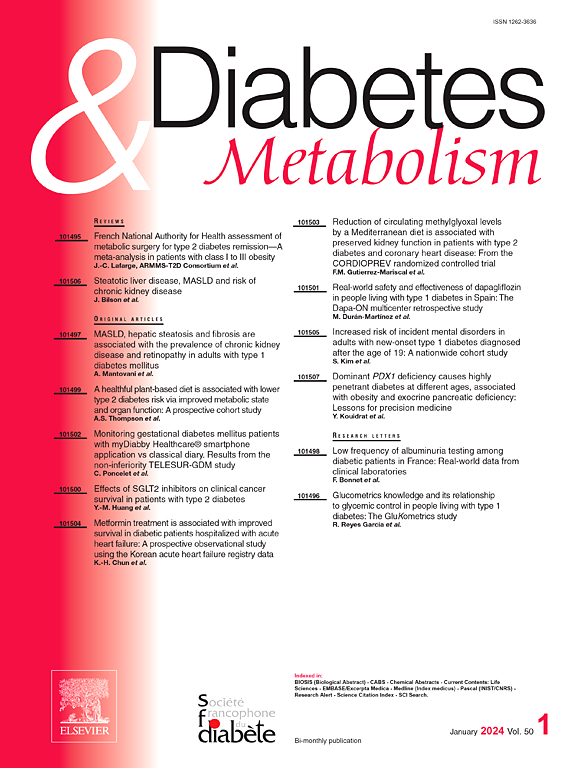胰高血糖素样肽-1受体激动剂在急性胰腺炎病史患者中的应用:TriNetX分析
IF 4.7
2区 医学
Q1 ENDOCRINOLOGY & METABOLISM
引用次数: 0
摘要
作品简介:。胰高血糖素样肽-1受体激动剂(GLP-1RAs)用于2型糖尿病(T2D)和肥胖患者。然而,对它们与急性胰腺炎(AP)的关联的担忧已经出现。我们的目的是评估有AP病史的GLP-1RAs患者AP复发的风险。本回顾性研究采用TriNetX平台。我们确定了有AP病史的成人队列,并分析了个体药物(GLP-1RAs、SGLT2i或DPP4i)对AP复发风险的影响。为了调整基线差异,在有和没有AP危险因素的队列中进行了倾向评分匹配。我们对672,069例AP和T2D病史患者的分析显示,与其他治疗方法相比,GLP-1RAs显著降低了风险。与SGLT2i和DPP-4i相比,在1至5年内,GLP-1RAs始终显示出较低的AP复发风险。具体来说,在一年的时间里,GLP-1RAs使用者与sgltti相比风险降低-0.071 (95% CI: -0.085至-0.057),与DPP-4i相比风险降低-0.064 (95% CI: -0.080至-0.048)。这种趋势持续下去,风险差异在第五年进一步扩大,分别达到-0.086和-0.094。结论:。基于我们的研究结果,我们得出结论,GLP-1RAs可以安全地用于有急性胰腺炎病史的受试者。虽然我们的分析显示,与DPP-IV抑制剂和SGLT2抑制剂相比,glp -1患者的AP复发风险显著降低,但由于这是一项回顾性分析,我们建议这些发现需要在前瞻性研究中得到证实。本文章由计算机程序翻译,如有差异,请以英文原文为准。
Use of glucagon-like peptide-1 receptor agonists in people with history of acute pancreatitis: TriNetX analysis
Introduction
Glucagon-like peptide-1 receptor agonists (GLP-1RAs) are used in subjects with type 2 diabetes (T2D) and obesity. However, concerns over their association with acute pancreatitis (AP) have emerged. Our aim was to evaluate the risk of recurrence of AP in subjects on GLP-1RAs with a history of AP.
Methods
This retrospective study deployed the TriNetX platform. We identified adult cohorts of subjects with a history of AP and analyzed the impact of individual medications (GLP-1RAs, SGLT2i, or DPP4i) on the risk of recurrence of AP. To adjust for baseline differences, propensity score matching was done in cohorts with and without risk factors for AP.
Results
Our analysis of 672,069 patients with a history of AP and T2D revealed significant risk reductions associated with GLP-1RAs compared to other treatments. Over one to five years, GLP-1RAs consistently showed a lower risk of AP recurrence compared to SGLT2i and DPP-4i. Specifically, over a one-year period, GLP-1RAs users had a risk reduction of -0.071 (95 % CI:0.085 to -0.057) (p < 0.001) compared to SGLT2i, and -0.064 (95 % CI:0.080 to -0.048) (p< 0.001) compared to DPP-4i. These trends persisted, with the risk differences further widening by the fifth year to -0.086 and -0.094, respectively.
Conclusion
Based on our findings, we conclude that GLP-1RAs may be safely used in subjects with a history of acute pancreatitis. While our analysis showed that there was a significantly lower risk of AP recurrence in subjects on GLP-1compared to DPP-IV inhibitors and SGLT2 inhibitors, as this is a retrospective analysis we suggest that these findings need to be confirmed in prospective studies.
求助全文
通过发布文献求助,成功后即可免费获取论文全文。
去求助
来源期刊

Diabetes & metabolism
医学-内分泌学与代谢
CiteScore
12.00
自引率
4.20%
发文量
86
审稿时长
13 days
期刊介绍:
A high quality scientific journal with an international readership
Official publication of the SFD, Diabetes & Metabolism, publishes high-quality papers by leading teams, forming a close link between hospital and research units. Diabetes & Metabolism is published in English language and is indexed in all major databases with its impact factor constantly progressing.
Diabetes & Metabolism contains original articles, short reports and comprehensive reviews.
 求助内容:
求助内容: 应助结果提醒方式:
应助结果提醒方式:


